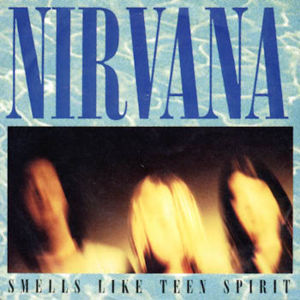Nirvana’s story began in 1987 in Aberdeen, Washington, when Kurt Cobain and Krist Novoselic formed a band that would eventually reshape rock music. Their early sound, captured on singles like “Love Buzz” and developed through constant performing in the Seattle underground scene, blended punk’s raw energy with unexpected melodic sensibility. The band recorded their debut album Bleach in 1989 with drummer Chad Channing for just $600, producing rough-edged tracks like “Negative Creep,” “About A Girl,” and “Dive” that showcased Cobain’s emerging songwriting talents while operating firmly within the regional grunge movement.
A significant shift occurred when drummer Dave Grohl joined in 1990, completing the classic Nirvana lineup. His powerful, precise drumming became essential to the band’s evolving sound as they recorded Nevermind with producer Butch Vig. Released in 1991, the album unexpectedly exploded into the mainstream, eventually displacing Michael Jackson at the top of the charts. “Smells Like Teen Spirit” became the unlikely anthem that introduced millions to alternative rock, while songs like “Come As You Are,” “Lithium,” and “In Bloom” demonstrated a perfect balance between accessibility and artistic integrity. The album’s range was impressive, from the aggressive punk energy of “Territorial Pissings” to quieter, more introspective pieces like “Polly” and “Something In The Way.”
Uncomfortable with sudden fame and determined to reclaim their artistic direction, Nirvana created a deliberately challenging follow-up with 1993’s In Utero. Working with producer Steve Albini, they crafted a rawer, less polished album featuring abrasive tracks like “Scentless Apprentice” alongside more melodic offerings such as “Heart-Shaped Box,” “Dumb,” and “All Apologies.” The album also included pointed commentary on their newfound fame with songs like “Serve The Servants” and “Rape Me.” Though initially controversial, In Utero has come to be recognized as a brave artistic statement that balanced commercial viability with uncompromising creative vision.
In November 1993, Nirvana recorded their legendary MTV Unplugged session, which aired shortly before being released as an album in 1994. This performance revealed yet another dimension of the band through acoustic renditions of lesser-known tracks like “Pennyroyal Tea” and “On a Plain,” alongside covers including “The Man Who Sold the World” and the haunting closer “Where Did You Sleep Last Night?” The stripped-down setting highlighted Cobain’s emotional vocal delivery and the underlying strength of the songwriting, proving Nirvana’s music could resonate beyond their electric intensity. Tragically, this would be one of their final recorded performances before Cobain’s death by suicide in April 1994, an event that stunned fans worldwide and prematurely ended the band’s career.
Nirvana’s final studio recording, “You Know You’re Right,” remained unreleased until 2002, serving as a poignant reminder of what might have been. Even with their relatively small catalog—spanning just seven years from formation to end—Nirvana’s influence remains immeasurable. They brought underground sounds to mainstream audiences, challenged gender norms in rock, and inspired countless musicians across genres. Beyond the mythology that formed after Cobain’s death, their music continues to connect with new generations through its emotional authenticity and artistic integrity. From early tracks like “Sliver” to expressions like “All Apologies,” Nirvana created music that captured genuine human experience in all its complexity—uncomfortable, beautiful, angry, and ultimately enduring.
Follow Tunes Du Jour on Facebook
Follow me on Bluesky
Follow me on Instagram
